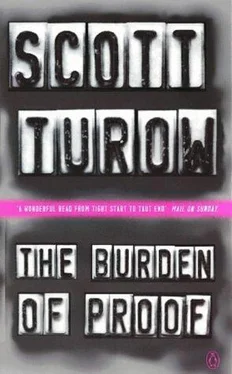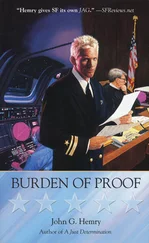Scott Turow - The Burden of Proof
Здесь есть возможность читать онлайн «Scott Turow - The Burden of Proof» весь текст электронной книги совершенно бесплатно (целиком полную версию без сокращений). В некоторых случаях можно слушать аудио, скачать через торрент в формате fb2 и присутствует краткое содержание. Жанр: Детектив, на английском языке. Описание произведения, (предисловие) а так же отзывы посетителей доступны на портале библиотеки ЛибКат.
- Название:The Burden of Proof
- Автор:
- Жанр:
- Год:неизвестен
- ISBN:нет данных
- Рейтинг книги:3 / 5. Голосов: 1
-
Избранное:Добавить в избранное
- Отзывы:
-
Ваша оценка:
- 60
- 1
- 2
- 3
- 4
- 5
The Burden of Proof: краткое содержание, описание и аннотация
Предлагаем к чтению аннотацию, описание, краткое содержание или предисловие (зависит от того, что написал сам автор книги «The Burden of Proof»). Если вы не нашли необходимую информацию о книге — напишите в комментариях, мы постараемся отыскать её.
The Burden of Proof — читать онлайн бесплатно полную книгу (весь текст) целиком
Ниже представлен текст книги, разбитый по страницам. Система сохранения места последней прочитанной страницы, позволяет с удобством читать онлайн бесплатно книгу «The Burden of Proof», без необходимости каждый раз заново искать на чём Вы остановились. Поставьте закладку, и сможете в любой момент перейти на страницу, на которой закончили чтение.
Интервал:
Закладка:
"Where shall we go, then?" he asked. "Are you hungry?"
"Really, no. I couldn't, not now. I lost whatever appetite I had. I don't take a drink very often, but I could use one now. You, too?"
He answered her again with a sound. "Under the circumstances, I could drink," he said.
"You know 'what might be nice? Why don't you stop at a package store and we can sit out by the river. There's a lovely spot. I'll show you."
So that is what they did. They bought a bottle of Southern Comfort and two cheap tumblers and drove a few blocks to a parking lot on a low bluff over the river. The river was wide here, black and wild with sound beneath them. The moon was up, high in the trees, filling the Kindle with racing light.
As she opened the bottle, he cautioned her..
"George," he said, "expects his car to be returned in mint condition."
She eyed him over the cap, unimpressed on this occasion by his mild humor.
"You're going to suffer terribly over this, aren't you?" He hesitated, then shook his head bravely,
"You wouldn't consider letting me pay for this, would you?" she asked.
He shook his head again.
"I could, you know. I have quite a bit of money. My mother's sister left a trust. It was available after I was twenty-five and it just sits there."
"And what would your father think of that?" … I don't care what my father thinks."
Stern again made his sound. He thought of her as he first saw her, on Henry's footstool.
"Do you care?" she asked. "About him?"
"I am afraid to say I do."
"I do, too," she said, after a moment. ' Td rather say I don't, but I do. I think most girls care more about their mothers, but my mother worships him. Is your family like that?"
Stern laughed, thinking of his father as he came to know him toward the end, an agitated, feckless human being on the verge of one breakdown or another.
"No," he said.
"Do you like my father?"
Stern contemplated the question. The engine was running, a throaty rumble, so they could have heat.
"I believe I am too afraid of him to know the answer." She laughed out loud "Do you know what I like about you, Sandy? You don't remind me of anyone."
He was tempted to remark about making virtues out of faults. But he realized that this pleased him. He was who he was. The car, the disaster, had allowed a remarkable candor between them. Moreover, as was usually true on the rare occasions when anyone could inspire him to straightforward response, he learned a good deal about himself.
"And how do you feel about your father?"
"The same as you," she said. ' `i admire him. When I was a girl, I wanted to be just like him. Before I realized that he wouldn't let me.
I resent him, I suppose. It's hard to know. My parents have been quite angry with me for some time."
Stern sat back against the door to look at her. The liquor had begun to make him warm and somewhat drunk.
"What is the story you seem to have to tell? I sense great unhappiness."
"Do you?"
"You must forgive me. I suppose that was rather blunt."
"Rather," she said. In the dark, fear reached up to seize him. He had gone too far. He was on a cliff with this girl.
At any moment this atmosphere of intimacy could fade and she could revert to being the daughter of a wealthy man, well beyond him. He knew that was what she meant before-that she did not know how to regard him.
Like any person born to great wealth, she was proficient with an offhanded officiousnessmshe could instantly push him off to a million-mile distance, if she wanted to.
'`i don't think of myself as a happy person," she said. I'm very shy.
Except around you." She smiled. "Are you happy?"
"I enjoy my work. I care for my sister. But no, I do not consider myself a cheerful person by disposition."
"I didn't think so," she said. They were both quiet. ''I'm going to tell you everything," Clara Mittler said presently.
He waited a moment in the dark before he said, "All right."
"MEL? Sandy Stern," he said into the telephone.
"San-dy!" cried Mel in return, the usual trumpet blast: hail fellow well met. Face for, ward, TooIcy had a single expression, a beaming countenance of unlimited goodwill. Turn your back, however, and the knives came out, the mischief started. An insidious fellow. TooIcy claimed to be Irish-it was in this city, like many others, a political advantage, particularly at the bar-but he had the swarthy look of a more Southerly heritage. Mel wore a wig-profuse, dark, and curly as the coat of a poodlea trait which Stern, in spite of his efforts at tolerance, found shabby and insincere. The man was always sweating and, in consequence, bathed in cologne. And he was overweight-not that Stern was the kind to criticize this fault; but Mel, cut to the dimensions of certain cattle, still favored double-breasted suits and flashy pocket hankies, and refused to accept biology as fate. He squeezed himself into tapered shirts and sat with his dark hairy gut bulging between the buttons, his oily smile suggesting an unambiguous belief that he was suave.
Stern had dealt with Mel for years when Tooley was a prosecutor, a prickly relation marked by many bitter struggles. Mel, in a word, was underhanded, an exception in an office in which most of the lawyers were overly aggressive but generally respectful of rules and rights.
Stern's most serious ran-in with Mel had occurred five years ago, when Stern represented a contractor whom Tooley desperately wanted to testify against two gentlemen whose names ended in vowels. The contractor had been granted immunity, but he persisted in a version of events which even Stern, privately, regarded as improbable. When he and his client showed up for his grand jury appearance, the contractor, a hard-boiled, tight-lipped kind, suddenly paled; the sweat on his scalp looked like rain. He was a Knights of Columbus man, the father of nine, and Tooley had the contractor's former mistress seated primly on the sofa outside the grand jury room. For the sake of his client, Stern, always reluctant to publicly criticize any attorney, had to file a disciplinary complaint with the District Court Executive Committee. The judges had clucked their tongues and chastised Mel, but in the end the contractor testified, and just as Mel liked. Tooley had the last laugh. Face to face, he claimed to bear no grudges and was quick to praise Stern's ability. But in a world where ego mattered so, one knew better than to believe that. Stern wondered again how it was John had wandered into Tooley's hands.
Tooley, now, said he had been about to call, a remark which Stern took as being within striking distance of the truth.
Tooley naturally was interested in making arrangements for MD to pay his fee. He wanted a $15,000 retainer-on the high side for a fellow of Tooley's age, but what Stern might have expected. They chatted as best they could about the case. Stern said nothing to Tooley about the house error account; he had to assume that every word would go back to the prosecutors, to be used however Too-ley saw fit, for John's advantage or simply as some way to curry favor for the future. Stern described the customer orders that the government was tracing, said the prosecutors seemed to think that Dixon had made some sort of improper profit;
"I take it that they believe the orders were placed witl John," said Stern.
"Were they?" inquired Tooley, as if he did not have a client to ask. "I mean, I don't have any documents to look at. I wouldn't mind seeing whatever you've turned over." Stern made a note and said that he would send them, "Well, of course," said Stern,
"he may have received' these orders but might be unable to recall them, given the crash of daily business. I have no idea whether or not that is a possibility, but a reasonable person might understand that." Tooley was very quick-he would not miss the hint-but he did not answer, which Stern regarded as unpromising.
Читать дальшеИнтервал:
Закладка:
Похожие книги на «The Burden of Proof»
Представляем Вашему вниманию похожие книги на «The Burden of Proof» списком для выбора. Мы отобрали схожую по названию и смыслу литературу в надежде предоставить читателям больше вариантов отыскать новые, интересные, ещё непрочитанные произведения.
Обсуждение, отзывы о книге «The Burden of Proof» и просто собственные мнения читателей. Оставьте ваши комментарии, напишите, что Вы думаете о произведении, его смысле или главных героях. Укажите что конкретно понравилось, а что нет, и почему Вы так считаете.












